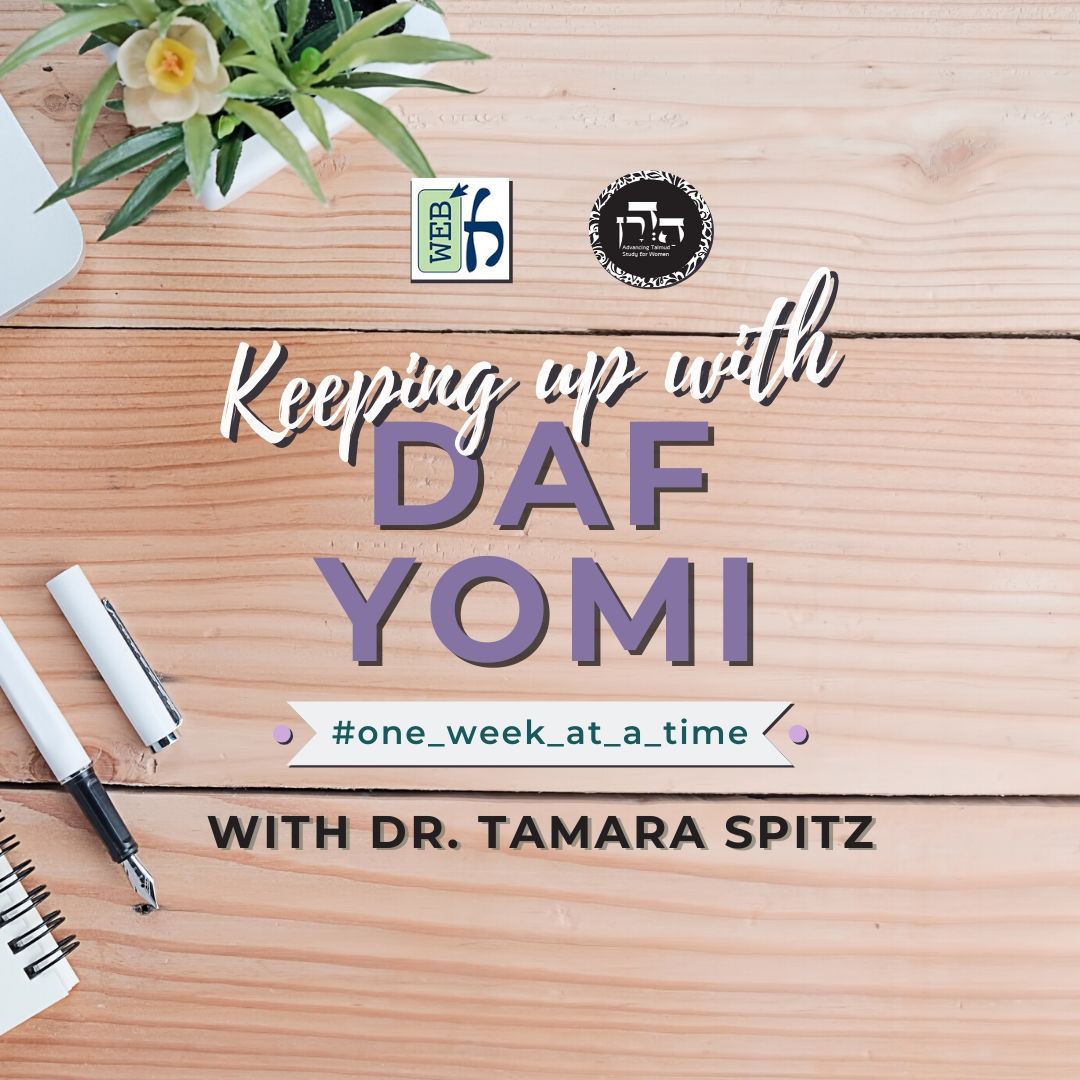רב ורבי יוחנן חולקים לגבי מקדמה בעסקה. האם שני הצדדים חייבים לקיים את ההסכם כולו, או שהמקדמה מחייבת אותם רק לחלק שכבר בוצע? הגמרא מציעה כי גם תנאים חולקים באותו עניין לגבי ביטול הלוואה (שמיטת כספים) בשנת השמיטה, כאשר חפץ שנלקח כמשכון אינו מכסה את מלוא שווי ההלוואה. אולם לסיכום, המחלוקת שם מוסבר בצורה אחרת – האם המשכון משמשת כתשלום או רק תזכורת לחוב? שאלות נוספות עולות: האם צד אחד יכול לפרק הסכם בעל פה? רב ורבי יוחנן חלוקים בשאלה האם פעולה זו משקף שהבנאדם לא אמין או לא. שני קשיים מועלים נגד רב ממקורות תנאיים ואחד נגד רבי יוחנן מתוך אמירה אחרת שאמר. רוב, אם לא כל הקשיים נפתרים. המשנה מגדירה בהלכות אונאה, חיוב יתר או בתשלום נמוך מדי. איזה אחוז מעורר אונאה, ובתוך איזה פרק זמן יכול קונה לטעון שהיתה אונאה? רב ושמואל מציעים דעות שונות האם אחוז זה מבוסס על שווי שוק בלבד, או גם על מחיר הקנייה של הפריט.
הלימוד השבוע מוקדש לזכות ולשלום הַיְימׇנוֹט אֱמוּנָה בַּת באנצ’י (קָסָאוּ) בת 11 שנעלמה במקום מגוריה בצפת, לפני שנתיים, ביום ט”ז אדר תשפ”ד (25.2.24), ולא נודעו עקבותיה.
הלימוד השבוע מוקדש למען ביטחון המדינה, החיילים והאזרחים, ולמען חירותו של העם האיראני. שנזכה בקרוב שיתקיים בנו הפסוק: "לַיְּהוּדִים הָיְתָה אוֹרָה וְשִׂמְחָה וְשָׂשֹׂן וִיקָר”.
הלימוד השבוע מוקדש לזכות וְלִשְׁלוֹם הָיימָנוֹט אֱמוּנָה בַּת באנצ’י (קָסָאוּ), בת 11 שנעלמה במקום מגוריה בצפת, לפני שנתיים, ביום ט”ז אדר תשפ״ד (25.2.24), ולא נודעו עקבותיה. אנו מתפללים שֶׁתִּמָּצֵא וְתוּשַׁב לביתה במהרה!
רוצה להקדיש שיעור?
כלים
הלימוד השבוע מוקדש לזכות ולשלום הַיְימׇנוֹט אֱמוּנָה בַּת באנצ’י (קָסָאוּ) בת 11 שנעלמה במקום מגוריה בצפת, לפני שנתיים, ביום ט”ז אדר תשפ”ד (25.2.24), ולא נודעו עקבותיה.
הלימוד השבוע מוקדש למען ביטחון המדינה, החיילים והאזרחים, ולמען חירותו של העם האיראני. שנזכה בקרוב שיתקיים בנו הפסוק: "לַיְּהוּדִים הָיְתָה אוֹרָה וְשִׂמְחָה וְשָׂשֹׂן וִיקָר”.
הלימוד השבוע מוקדש לזכות וְלִשְׁלוֹם הָיימָנוֹט אֱמוּנָה בַּת באנצ’י (קָסָאוּ), בת 11 שנעלמה במקום מגוריה בצפת, לפני שנתיים, ביום ט”ז אדר תשפ״ד (25.2.24), ולא נודעו עקבותיה. אנו מתפללים שֶׁתִּמָּצֵא וְתוּשַׁב לביתה במהרה!
כלים
העמקה
רוצה להבין מה באמת קורה מתחת לפני השטח של הסוגיה?
שיעורים, פודקאסטים והרחבות של מיטב המורות שלנו יפתחו לך עוד זוויות וכיווני חשיבה.
חדשה בלימוד הגמרא?
זה הדף הראשון שלך? איזו התרגשות עצומה! יש לנו בדיוק את התכנים והכלים שיעזרו לך לעשות את הצעדים הראשונים ללמידה בקצב וברמה שלך, כך תוכלי להרגיש בנוח גם בתוך הסוגיות המורכבות ומאתגרות.
פסיפס הלומדות שלנו
גלי את קהילת הלומדות שלנו, מגוון נשים, רקעים וסיפורים. כולן חלק מתנועה ומסע מרגש ועוצמתי.
בבא מציעא מט
אֶלָּא מַשְׁכּוֹן דְּנָקֵיט לְמָה לֵיהּ? אֶלָּא לָאו, שְׁמַע מִינֵּיהּ: מַאי ״אֵינוֹ מְשַׁמֵּט״ דְּקָאָמַר רַבָּן שִׁמְעוֹן בֶּן גַּמְלִיאֵל – אֵינוֹ מְשַׁמֵּט בְּכוּלּוֹ, וּמַאי ״מְשַׁמֵּט״ דְּקָאָמַר רַבִּי יְהוּדָה הַנָּשִׂיא – לְהָךְ פַּלְגָא דְּלָא נָקֵיט עֲלֵיהּ מַשְׁכּוֹן.
If that half is canceled as well, then why does he need the collateral that he is holding? The lender clearly took the collateral to enable him to collect at least part of his debt after the Sabbatical Year. Rather, do we not conclude from it: What is the meaning of the statement: The Sabbatical Year does not abrogate the loan, that Rabban Shimon ben Gamliel is saying? It means that the Sabbatical Year does not abrogate the entire loan. And what is the meaning of: The Sabbatical Year abrogates the loan, that Rabbi Yehuda HaNasi is saying? It is referring to that half of the loan that he did not take on the basis of collateral.
וּבְהָא קָמִיפַּלְגִי, דְּרַבָּן שִׁמְעוֹן בֶּן גַּמְלִיאֵל סָבַר: כְּנֶגֶד כּוּלּוֹ הוּא קוֹנֶה, וְרַבִּי יְהוּדָה הַנָּשִׂיא סָבַר: כְּנֶגְדּוֹ הוּא קוֹנֶה.
And they disagree with regard to this: As Rabban Shimon ben Gamliel holds that a down payment effects acquisition of merchandise commensurate with the entire amount of the transaction, and Rabbi Yehuda HaNasi holds that a down payment effects acquisition of merchandise commensurate with its value. Apparently, the amoraic dispute parallels the tannaitic dispute.
לָא, מַאי ״אֵינוֹ מְשַׁמֵּט״ דְּקָאָמַר רַבָּן שִׁמְעוֹן בֶּן גַּמְלִיאֵל – לְהָךְ פַּלְגָא דְּנָקֵיט עֲלֵיהּ מַשְׁכּוֹן, מִכְּלָל דְּרַבִּי יְהוּדָה הַנָּשִׂיא סָבַר: לְהָךְ פַּלְגָא דְּנָקֵיט עֲלֵיהּ מַשְׁכּוֹן נָמֵי מְשַׁמֵּט. אֶלָּא מַשְׁכּוֹן דְּנָקֵיט, לְמָה לֵיהּ? לְזִכְרוֹן דְּבָרִים בְּעָלְמָא.
The Gemara rejects that parallel: No, what is the meaning of the statement: The Sabbatical Year does not abrogate the loan, that Rabban Shimon ben Gamliel is saying? It is referring to that half of the loan that he took on the basis of collateral. This indicates by inference that Rabbi Yehuda HaNasi holds: The Sabbatical Year also abrogates that half of the loan that he took on the basis of collateral. The Gemara asks: Then why does he need the collateral that he is holding? The Gemara answers: He requires it as a mere reminder to increase the likelihood that the loan will be repaid, and it does not prevent cancellation of a loan.
רַב כָּהֲנָא יְהַבוּ לֵיהּ זוּזֵי אַכִּיתָּנָא, לְסוֹף אִיַּיקַּר כִּיתָּנָא. אֲתָא לְקַמֵּיהּ דְּרַב. אֲמַר לֵיהּ: בְּמַאי דִּנְקִיטַתְּ זוּזֵי – הַב לְהוּ, וְאִידַּךְ – דְּבָרִים נִינְהוּ, וּדְבָרִים אֵין בָּהֶן מִשּׁוּם מְחוּסְּרֵי אֲמָנָה.
§ The Gemara relates: Buyers gave money to Rav Kahana to purchase linen. Ultimately, the price of linen increased. Rav Kahana came before Rav to ask his opinion. Rav said to him: Give them a quantity of linen equivalent in value to the money that you received, and concerning the rest, your verbal commitment is merely a statement, and reneging on a verbal commitment that was unaccompanied by an act of acquisition does not constitute an act of bad faith.
דְּאִיתְּמַר: דְּבָרִים, רַב אָמַר: אֵין בָּהֶן מִשּׁוּם מְחוּסְּרֵי אֲמָנָה, וְרַבִּי יוֹחָנָן אָמַר: יֵשׁ בָּהֶם מִשּׁוּם מְחוּסְּרֵי אֲמָנָה.
The Gemara comments: This is as it was stated: There is an amoraic dispute with regard to reneging on a verbal commitment that was unaccompanied by an act of acquisition. Rav says: It does not constitute an act of bad faith. And Rabbi Yoḥanan says: It constitutes an act of bad faith.
מֵיתִיבִי, רַבִּי יוֹסֵי בְּרַבִּי יְהוּדָה אוֹמֵר: מָה תַּלְמוּד לוֹמַר ״הִין צֶדֶק״, וַהֲלֹא ״הִין״ בִּכְלַל אֵיפָה הָיָה? אֶלָּא לוֹמַר לָךְ: שֶׁיְּהֵא הֵן שֶׁלְּךָ צֶדֶק, וְלָאו שֶׁלְּךָ צֶדֶק. אָמַר אַבָּיֵי: הָהוּא שֶׁלֹּא יְדַבֵּר אֶחָד בַּפֶּה וְאֶחָד בַּלֵּב.
The Gemara raises an objection: Rabbi Yosei, son of Rabbi Yehuda, says: What is the meaning when the verse states: “A just ephah, and a just hin, shall you have” (Leviticus 19:36)? But wasn’t a hin included in an ephah? Why is it necessary to state both? Rather, this is an allusion that serves to say to you that your yes [hen] should be just, and your no should be just. Apparently, it is a mitzva for one to fulfill his promises. Abaye says: That verse means that one should not say one matter with his mouth and think one other matter in his heart. It is prohibited for one to make a commitment that he has no intention of fulfilling. Rav Kahana made his commitment in good faith and reneged due to changed circumstances. That is not prohibited.
מֵיתִיבִי, רַבִּי שִׁמְעוֹן אוֹמֵר: אַף עַל פִּי שֶׁאָמְרוּ טַלִּית קוֹנָה דִּינַר זָהָב, וְאֵין דִּינַר זָהָב קוֹנֶה טַלִּית, מִכׇּל מָקוֹם כָּךְ הֲלָכָה. אֲבָל אָמְרוּ: מִי שֶׁפָּרַע מֵאַנְשֵׁי דּוֹר הַמַּבּוּל וּמֵאַנְשֵׁי דּוֹר הַפְּלַגָּה הוּא עָתִיד לִיפָּרַע מִמִּי שֶׁאֵינוֹ עוֹמֵד בְּדִיבּוּרוֹ!
The Gemara raises an objection. Rabbi Shimon says: Even though the Sages said that when one party takes possession of a garment, the other party acquires a gold dinar, but when one party takes possession of a gold dinar, the other party does not acquire a garment, in any case, that is what the halakha would be. But the Sages said with regard to one who reneges on a transaction where one party pulled the gold dinar into his possession: He Who exacted payment from the people of the generation of the flood, and from the people of the generation of the dispersion, and from the inhabitants of Sodom and Gomorrah, and from the Egyptians in the Red Sea, will in the future exact payment from whoever does not stand by his statement. And one who negotiates, where the negotiation culminates with a statement in which he commits himself to acquire the item, did not acquire the item without a formal act of acquisition. But with regard to one who reneges on his commitment, the Sages are displeased with him. Apparently, one who reneges is considered to have acted in bad faith.
תַּנָּאֵי הִיא. דִּתְנַן: מַעֲשֶׂה בְּרַבִּי יוֹחָנָן בֶּן מַתְיָא שֶׁאָמַר לִבְנוֹ: צֵא וּשְׂכוֹר לָנוּ פּוֹעֲלִים. הָלַךְ וּפָסַק לָהֶם מְזוֹנוֹת. וּכְשֶׁבָּא אֵצֶל אָבִיו, אָמַר לוֹ: בְּנִי, אֲפִילּוּ אַתָּה עוֹשֶׂה לָהֶם כִּסְעוּדַת שְׁלֹמֹה בִּשְׁעָתוֹ לֹא יָצָאתָ יְדֵי חוֹבָתְךָ עִמָּהֶם, שֶׁהֵן בְּנֵי אַבְרָהָם יִצְחָק וְיַעֲקֹב. אֶלָּא עַד שֶׁלֹּא יַתְחִילוּ בִּמְלָאכָה, צֵא וֶאֱמוֹר לָהֶם: עַל מְנָת שֶׁאֵין לָכֶם עָלַי אֶלָּא פַּת וְקִטְנִית בִּלְבַד.
The Gemara explains: This matter is a dispute between tanna’im, as we learned in a mishna (Bava Metzia 83a): There was an incident involving Rabbi Yoḥanan ben Matya, who said to his son: Go out and hire laborers for us. His son went and allocated sustenance for them, as part of their employment terms, without specifying the type of sustenance. And when he came to his father, his father said to him: My son, even if you prepare for them a meal like the feast of Solomon during his era, you will not fulfill your obligation to them, as they are the descendants of Abraham, Isaac, and Jacob, and due to that status they are deserving of any meal that they want. Rather, this is what you should do: Before they begin engaging in their labor, go out and say to them: Your employment is on the condition that you have the right to claim from me only the customary meal of bread and legumes.
וְאִי סָלְקָא דַעְתָּךְ דְּבָרִים יֵשׁ בָּהֶן מִשּׁוּם מְחוּסְּרֵי אֲמָנָה, הֵיכִי אֲמַר לֵיהּ זִיל הֲדַר בָּךְ? שָׁאנֵי הָתָם, דְּפוֹעֲלִים גּוּפַיְיהוּ לָא סָמְכָא דַּעְתַּיְיהוּ. מַאי טַעְמָא – מִידָּע יָדְעִי דְּעַל אֲבוּהּ סָמֵךְ.
The Gemara asks: And if it enters your mind that reneging on a verbal commitment unaccompanied by an act of acquisition constitutes an act of bad faith, how did Rabbi Yoḥanan ben Matya tell his son to renege? The Gemara answers: This is not difficult; it is different there in that case, as the laborers themselves do not rely on the son. What is the reason they do not rely on the son? It is due to the fact that they know that he relied on his father giving his approval when committing to feed them.
אִי הָכִי, אֲפִילּוּ הִתְחִילוּ בִּמְלָאכָה נָמֵי? הִתְחִילוּ בִּמְלָאכָה, וַדַּאי סָמְכִי דַּעְתַּיְיהוּ, אֲמַרוּ: מֵימָר אָמַר קַמֵּיהּ דַּאֲבוּהּ וְנִיחָא לֵיהּ.
The Gemara asks: If so, then even if the laborers began engaging in their labor, they still would not rely on the son. Why then did his father instruct him specifically to tell them of the change before they began their labor? The Gemara answers: Once they began engaging in their labor they would certainly rely on the son’s commitment, as they would say: He must have come before his father and stated the conditions of their employment, and his father is amenable to those terms. Therefore, it was necessary to inform them before they began working.
וּמִי אָמַר רַבִּי יוֹחָנָן הָכִי? וְהָאָמַר רַבָּה בַּר בַּר חָנָה אָמַר רַבִּי יוֹחָנָן: הָאוֹמֵר לַחֲבֵירוֹ מַתָּנָה אֲנִי נוֹתֵן לָךְ – יָכוֹל לַחֲזוֹר בּוֹ. יָכוֹל, פְּשִׁיטָא! אֶלָּא: מוּתָּר לַחֲזוֹר בּוֹ. אָמַר רַב פָּפָּא: וּמוֹדֶה רַבִּי יוֹחָנָן בְּמַתָּנָה מוּעֶטֶת, דְּסָמְכָא דַּעְתַּיְיהוּ.
The Gemara asks: And did Rabbi Yoḥanan say this, i.e., that one who reneges on a verbal commitment acted in bad faith? But didn’t Rabba bar bar Ḥana say that Rabbi Yoḥanan says: One who says to another: I am giving you a gift, is able to renege on his commitment? The Gemara asks: He is able to renege? It is obvious that he is able to renege, as in the absence of an act of acquisition no one can compel him to give the gift. Rather, it means: It is permitted for him to renege on his commitment. Apparently, one who reneges on a verbal guarantee is not considered to have acted in bad faith. Rav Pappa said: And Rabbi Yoḥanan concedes that in the case of a small gift one may not renege, as the recipients rely on him to fulfill his verbal commitment. By contrast, in the case of a large gift the recipients are aware that one might reconsider, and therefore they do not rely on his statement and do not assume that his decision is final.
הָכִי נָמֵי מִסְתַּבְּרָא, דְּאָמַר רַבִּי אֲבָהוּ אָמַר רַבִּי יוֹחָנָן: יִשְׂרָאֵל שֶׁאָמַר לְבֶן לֵוִי: כּוֹר מַעֲשֵׂר יֵשׁ לְךָ בְּיָדִי. בֶּן לֵוִי רַשַּׁאי לַעֲשׂוֹתוֹ תְּרוּמַת מַעֲשֵׂר עַל מָקוֹם אַחֵר. אִי אָמְרַתְּ בִּשְׁלָמָא לָא מָצֵי לְמִיהְדַּר בֵּיהּ – מִשּׁוּם הָכִי רַשַּׁאי. אֶלָּא אִי אָמְרַתְּ מָצֵי לְמִיהְדַּר בֵּיהּ, אַמַּאי רַשַּׁאי? אִישְׁתְּכַח דְּקָא אָכֵיל טְבָלִים!
The Gemara comments: So too, it is reasonable to say that this is the opinion of Rabbi Yoḥanan, as Rabbi Abbahu says that Rabbi Yoḥanan says: With regard to an Israelite who said to a Levite: You have a kor of first-tithe produce that is in my possession and that I separated from my produce, the Levite may render all or part of this kor teruma of the tithe for first-tithe produce that he has in another place. Granted, if you say that one is unable, i.e., it is not permitted for him, to renege, it is due to that reason that the Levite may render it teruma of the tithe for other produce. But if you say that one is able, i.e., it is permitted for him, to renege, why may he render it teruma of the tithe for other produce? The owner of the produce could renege, and in that case it will eventuate that he is consuming untithed produce, as the teruma of the tithe that he separated did not belong to him.
הָכָא בְּמַאי עָסְקִינַן – כְּגוֹן שֶׁנְּטָלוֹ מִמֶּנּוּ וְחָזַר וְהִפְקִידוֹ אֶצְלוֹ.
The Gemara answers: With what are we dealing here? We are dealing with a case where the Levite took the first-tithe produce from him and then deposited it with him, so that it already belongs to the Levite.
אִי הָכִי אֵימָא סֵיפָא: נְתָנוֹ לְבֶן לֵוִי אַחֵר – אֵין לוֹ עָלָיו אֶלָּא תַּרְעוֹמֶת. וְאִי סָלְקָא דַעְתָּךְ כְּגוֹן שֶׁנְּטָלוֹ מִמֶּנּוּ וְחָזַר וְהִפְקִידוֹ אֶצְלוֹ, אַמַּאי אֵין לוֹ עָלָיו אֶלָּא תַּרְעוֹמֶת? כֵּיוָן דְּמַשְׁכֵיהּ מָמוֹנָא אִית לֵיהּ גַּבֵּיהּ! אֶלָּא לָאו, שְׁמַע מִינַּהּ בִּדְלָא נְטָלוֹ. שְׁמַע מִינַּהּ.
The Gemara asks: If so, that this is the circumstance addressed in the statement of Rabbi Yoḥanan, say the latter clause of that halakha: If the owner of the produce gave the first-tithe produce to a different Levite, the first Levite has only a grievance against the owner, but not any legal claim. And if it enters your mind that this is a case where the first Levite took the first-tithe produce from the owner and then deposited it with him, why does the Levite have only a grievance against him? Once the first Levite pulled the produce into his possession it is his, and therefore, he has property in the possession of the owner of the produce. Rather, must one not conclude from it that this is a case where the Levite did not take the produce and deposit it? The Gemara affirms: Conclude from it that there was only a verbal commitment, and that proves that reneging on a verbal commitment constitutes an act of bad faith.
הָהוּא גַּבְרָא דִּיהַיב זוּזֵי אַשּׁוּמְשְׁמֵי. לְסוֹף אִיַּיקַּר שׁוּמְשְׁמֵי. הֲדַרוּ בְּהוּ וַאֲמַרוּ לֵיהּ: לֵית לַן שׁוּמְשְׁמֵי, שְׁקוֹל זוּזָךְ. לָא שְׁקֵיל זוּזֵיהּ, אִיגְּנוּב. אֲתוֹ לְקַמֵּיהּ דְּרָבָא. אֲמַר לֵיהּ: כֵּיוָן דְּאָמְרִי לָךְ שְׁקוֹל זוּזָךְ וְלָא שְׁקַלְיתְּ, לָא מִבַּעְיָא שׁוֹמֵר שָׂכָר דְּלָא הָוֵי, אֶלָּא אֲפִילּוּ שׁוֹמֵר חִנָּם נָמֵי לָא הָוֵי. אֲמַרוּ לֵיהּ רַבָּנַן לְרָבָא: וְהָא בָּעֵי לְקַבּוֹלֵי עֲלֵיהּ ״מִי שֶׁפָּרַע״? אֲמַר לְהוּ: הָכִי נָמֵי.
The Gemara relates: There was a certain man who gave money as payment for sesame. Ultimately, the price of sesame increased, and the sellers reneged and said to him: We have no sesame; take your money. The buyer did not take his money, and the money was stolen. They came before Rava to adjudicate the case. Rava said to the buyer: Once they said to you: Take your money, and you did not take it, it is not necessary to say that their legal status is not that of a paid bailee. But my ruling is that their legal status is not even that of an unpaid bailee. The Sages said to Rava: But aren’t the sellers who reneged required to accept upon themselves the curse: He Who exacted payment? Rava said to them: Indeed, they must pay or accept the curse.
אָמַר רַב פַּפֵּי, אָמַר לִי רָבִינָא: לְדִידִי אֲמַר לִי הָהוּא מֵרַבָּנַן וְרַב טָבוּת שְׁמֵיהּ, וְאָמְרִי לַהּ רַב שְׁמוּאֵל בַּר זוּטְרָא שְׁמֵיהּ, דְּאִי הֲווֹ יָהֲבִי לֵיהּ כֹּל חֲלָלָא דְעָלְמָא לָא (הֲוֵי קָא) [הָוֵה] מְשַׁנֵּי בְּדִבּוּרֵיהּ. בְּדִידִי הֲוָה עוֹבָדָא: הָהוּא יוֹמָא אַפַּנְיָא דְּמַעֲלֵי שַׁבְּתָא הֲוָה, וַהֲוָה יָתֵיבְנָא, וַאֲתָא הָהוּא גַּבְרָא וְקָאֵי אַבָּבָא. אֲמַר לִי: אִית לָךְ שׁוּמְשְׁמֵי לְזַבּוֹנֵי?
Rav Pappi said that Ravina said to me: One of the Sages, and Rav Tavot is his name, and some say Rav Shmuel bar Zutra is his name, and he is one who even if they were to give him the entire expanse of the world he would not deviate from the truth in his speech, said to me: There was an incident in which I was involved. On that day, it was twilight on Shabbat eve, and I was sitting, and a certain man came and stood at the entrance. He said to me: Do you have sesame to sell?
אֲמַרִי לֵיהּ: לָא. אֲמַר לִי: לֶיהְווֹ הָנָךְ זוּזֵי בְּפִקָּדוֹן גַּבָּךְ, דְּהָא חֲשַׁכָה לִי. אֲמַרִי לֵיהּ: הָא בֵּיתָא קַמָּךְ. אוֹתְבִינְהוּ בְּבֵיתָא וְאִיגְּנוּב. אֲתָא לְקַמֵּיהּ דְּרָבָא. אֲמַר לֵיהּ: כֹּל ״הָא בֵּיתָא קַמָּךְ״ לָא מִיבַּעְיָא שׁוֹמֵר שָׂכָר דְּלָא הָוֵי, אֶלָּא אֲפִילּוּ שׁוֹמֵר חִנָּם נָמֵי לָא הָוֵי. אֲמַרִי לֵיהּ: וְהָא אֲמַרוּ [לֵיהּ] רַבָּנַן לְרָבָא: אִיבְּעִי לֵיהּ לְקַבּוֹלֵי עֲלֵיהּ ״מִי שֶׁפָּרַע״. וַאֲמַר לִי: לֹא הָיוּ דְבָרִים מֵעוֹלָם.
I said to him: No. He said to me: Let these dinars remain as a deposit with you, as the day has grown dark for me and I am unable to reach home before Shabbat. I said to him: This house is before you. He placed them in the house and the dinars were stolen. That man came to have his case judged before Rava, demanding his money. Rava said to him: With regard to anyone who states: This house is before you, it is not necessary to say that he is not a paid bailee, but he is not even an unpaid bailee. Ravina said to Rav Tavot: But didn’t the Sages say to Rava: The sesame merchant is required to accept upon himself the curse: He Who exacted payment? And Rav Tavot said to me: There were never such matters; that incident never occurred.
רַבִּי שִׁמְעוֹן אוֹמֵר: כֹּל שֶׁהַכֶּסֶף בְּיָדוֹ – יָדוֹ עַל הָעֶלְיוֹנָה וְכוּ׳. תַּנְיָא, אָמַר רַבִּי שִׁמְעוֹן: אֵימָתַי – בִּזְמַן שֶׁהַכֶּסֶף וְהַפֵּירוֹת בְּיַד מוֹכֵר. אֲבָל כֶּסֶף בְּיַד מוֹכֵר וּפֵירוֹת בְּיַד לוֹקֵחַ – אֵינוֹ יָכוֹל לַחֲזוֹר בּוֹ, מִפְּנֵי שֶׁכַּסְפּוֹ בְּיָדוֹ. ״בְּיָדוֹ״?! בְּיַד מוֹכֵר הוּא. אֶלָּא – מִפְּנֵי שֶׁדְּמֵי כַסְפּוֹ בְּיָדוֹ.
§ The mishna teaches that Rabbi Shimon says: Anyone who has the money in his possession has the advantage. It is taught in a baraita: Rabbi Shimon says: When does the one with the money in his possession have the advantage? It is when both the money and the produce are in the possession of the seller. But if the money is in the possession of the seller and the produce is in the possession of the buyer, the seller cannot renege, because his money is in his possession. The Gemara understood this to mean that the buyer still had the money in his possession, and asks: In his, i.e., the buyer’s, possession? Isn’t it in the possession of the seller? Rather, emend the text: Because the value of his, i.e., the buyer’s, money is in his, i.e., the buyer’s, possession.
פְּשִׁיטָא! אָמַר רָבָא: הָכָא בְּמַאי עָסְקִינַן – כְּגוֹן שֶׁהָיְתָה עֲלִיָּיה שֶׁל לוֹקֵחַ מוּשְׂכֶּרֶת בְּיַד מוֹכֵר. טַעְמָא מַאי תַּקִּינוּ רַבָּנַן מְשִׁיכָה – גְּזֵירָה שֶׁמָּא יֹאמַר לוֹ נִשְׂרְפוּ חִטֶּיךָ בַּעֲלִיָּיה. הָכָא בִּרְשׁוּתֵיהּ דְּלוֹקֵחַ נִינְהוּ, אִי נָפְלָה דְּלֵיקָה בְּאוֹנֶס – אִיהוּ טָרַח וּמַיְיתֵי לַהּ.
The Gemara asks: Isn’t it obvious that the seller cannot renege, as the buyer acquired the produce through the transaction of pulling? Rava said: With what are we dealing here? It is a case where the upper story of the house belonging to the buyer, where the produce was stored, was rented to the seller. The Gemara elaborates: What is the reason the Sages instituted that pulling, and not payment of money, effects acquisition? It is a rabbinic decree, lest a seller say to the buyer: Your wheat burned in the upper story after you paid. Here, the produce is in the domain of the buyer. Therefore, if a fire is ignited due to circumstances beyond his control, the buyer will exert himself and bring the produce from the upper story.
הָהוּא גַּבְרָא דִּיהַיב זוּזֵי אַחַמְרָא. לְסוֹף שְׁמַע דְּקָא בָעֵי לְמִנְסְבֵיהּ דְּבֵי פַּרְזַק רוּפִילָא. אֲמַר לֵיהּ: הַב לִי זוּזַי, לָא בָּעֵינָא חַמְרָא. אֲתָא לְקַמֵּיהּ דְּרַב חִסְדָּא, אֲמַר לֵיהּ: כְּדֶרֶךְ שֶׁתִּיקְּנוּ מְשִׁיכָה בַּמּוֹכְרִין כָּךְ תִּיקְּנוּ מְשִׁיכָה בַּלָּקוֹחוֹת.
The Gemara relates: There was a certain man who gave money in exchange for wine. Ultimately he heard that men from the house of Parzak the vizier [rufila] sought to appropriate the wine. The buyer said to the seller: Give me my money, as I do not want the wine. The case came before Rav Ḥisda, who said to him: Just as the Sages instituted pulling with regard to sellers, so did they institute pulling with regard to buyers. Since the buyer had yet to pull the wine into his possession, he can renege on the transaction.
מַתְנִי׳ הָאוֹנָאָה, אַרְבָּעָה כֶּסֶף מֵעֶשְׂרִים וְאַרְבָּעָה כֶּסֶף לַסֶּלַע, שְׁתוּת לְמִקָּח. עַד מָתַי מוּתָּר לְהַחְזִיר? עַד כְּדֵי שֶׁיַּרְאֶה לַתַּגָּר אוֹ לִקְרוֹבוֹ.
MISHNA: The measure of exploitation for which one can claim that he was exploited is four silver ma’a from the twenty-four silver ma’a in a sela, or one-sixth of the transaction. Until when is it permitted for the buyer to return the item? He may return it only until a period of time has passed that would allow him to show the merchandise to a merchant or to his relative who is more familiar with the market price of merchandise. If more time has elapsed he can no longer return the item, as the assumption is that he waived his right to receive the sum of the disparity.
הוֹרָה רַבִּי טַרְפוֹן בְּלוֹד: הָאוֹנָאָה שְׁמוֹנָה כֶּסֶף מֵעֶשְׂרִים וְאַרְבַּע כֶּסֶף לַסֶּלַע, שְׁלִישׁ לְמִקָּח. וְשָׂמְחוּ תַּגָּרֵי לוֹד. אָמַר לָהֶם: כׇּל הַיּוֹם מוּתָּר לַחְזוֹר. אָמְרוּ לוֹ יַנִּיחַ לָנוּ רַבִּי טַרְפוֹן בִּמְקוֹמֵינוּ, וְחָזְרוּ לְדִבְרֵי חֲכָמִים.
The mishna continues: Rabbi Tarfon ruled in Lod: Exploitation is a measure of eight silver ma’a from the twenty-four silver ma’a of a sela, one-third of the transaction. And the merchants of Lod rejoiced, as this ruling allowed them a greater profit margin and rendered the nullification of a transaction less likely. Rabbi Tarfon said to them: Throughout the entire day it is permitted to renege on the transaction and not merely for the period of time it takes to show the purchase item to a merchant or a relative. The merchants of Lod said to him: Let Rabbi Tarfon leave us as we were, with the previous ruling, and they reverted to following the statement of the Rabbis in the mishna with regard to both rulings.
גְּמָ׳ אִתְּמַר: רַב אָמַר: שְׁתוּת מִקָּח שָׁנִינוּ. וּשְׁמוּאֵל אָמַר: שְׁתוּת מָעוֹת נָמֵי שָׁנִינוּ. שָׁוֵי שִׁיתָּא בְּחַמְשָׁא, שָׁוֵי שִׁיתָּא בְּשִׁבְעָה – כּוּלֵּי עָלְמָא לָא פְּלִיגִי דְּבָתַר מִקָּח אָזְלִינַן וְאוֹנָאָה הָוְיָא. כִּי פְּלִיגִי שָׁוֵי חַמְשָׁא בְּשִׁיתָּא וְשָׁוֵי שִׁבְעָה בְּשִׁיתָּא.
GEMARA: It was stated that there is an amoraic dispute with regard to exploitation. Rav says: We learned that exploitation is determined by one-sixth of the transaction, i.e., one-sixth of the purchase item, not one-sixth of the money paid. And Shmuel says: We learned that exploitation is also determined by one-sixth of the money paid. The Gemara elaborates: With regard to an item worth six ma’a that was sold for five ma’a, or an item worth six ma’a that was sold for seven ma’a, everyone agrees that we follow the transaction, i.e., the fraction of the variation in price is determined relative to the market value of the item sold, and it is exploitation. Where Rav and Shmuel disagree is in the case of an item worth five ma’a sold for six ma’a, or an item worth seven ma’a sold for six ma’a.
לִשְׁמוּאֵל דְּאָמַר: בָּתַר מָעוֹת אָזְלִינַן, אִידֵּי וְאִידֵּי אוֹנָאָה הָוֵי. לְרַב דְּאָמַר: בָּתַר מִקָּח אָזְלִינַן, שָׁוֵי חַמְשָׁא בְּשִׁיתָּא בִּיטּוּל מִקָּח הָוְיָא. שָׁוֵי שִׁבְעָה בְּשִׁיתָּא, מְחִילָה הָוְיָא.
According to Shmuel, who says that we also follow the fraction of the variation in price as determined by the money paid, both this case and that case are exploitation, as there is a disparity of one-sixth between the price paid and the value of the item. According to Rav, who says that we follow the transaction, when an item worth five ma’a sells for six ma’a, the halakha is that there is a nullification of the transaction, as the disparity between the value of the item and the price paid is greater than one-sixth. When an item worth seven ma’a sells for six ma’a, the halakha is that there is a waiver of the sum of the disparity, as the disparity between the value of the item and the price paid is less than one-sixth.
וּשְׁמוּאֵל אָמַר: כִּי אָמְרִינַן מְחִילָה וּבִיטּוּל מִקָּח – הֵיכָא דְּלֵיכָּא שְׁתוּת מִשְּׁנֵי צְדָדִים. אֲבָל הֵיכָא דְּאִיכָּא שְׁתוּת מִצַּד אֶחָד – אוֹנָאָה הָוְיָא.
And Shmuel says: When we say that there is a waiver or a nullification of the transaction, it is in a case where there is not a disparity of one-sixth from both aspects, i.e., both in terms of the money paid and in terms of the value of the item. But in a case where there is a disparity of one-sixth from one aspect, either in terms of the money paid or the value of the item, it is exploitation.
תְּנַן: הָאוֹנָאָה אַרְבָּעָה כֶּסֶף מֵעֶשְׂרִים וְאַרְבָּעָה כֶּסֶף לַסֶּלַע, שְׁתוּת לְמִקָּח. מַאי לָאו, דְּזַבֵּין שָׁוֵי עֶשְׂרִים בְּעֶשְׂרִין וְאַרְבְּעָה, וּשְׁמַע מִינַּהּ: שְׁתוּת מָעוֹת נָמֵי שָׁנִינוּ! לָא, דְּזַבֵּין שָׁוֵי עֶשְׂרִים וְאַרְבְּעָה בְּעֶשְׂרִים.
The Gemara cites proof for the opinions of Rav and Shmuel. We learned in the mishna: The measure of exploitation for which one can claim that he was exploited is four silver ma’a from the twenty-four silver ma’a in a sela, which is one-sixth of the transaction. What, is it not a case where he bought an item worth twenty ma’a for twenty-four ma’a? And accordingly, one can conclude from the mishna that we learned that exploitation is also determined by one-sixth of the money paid, in accordance with the opinion of Shmuel. The Gemara rejects this proof: No, it is a case where he sold an item worth twenty-four ma’a for twenty ma’a.
מִי נִתְאַנָּה – מוֹכֵר. אֵימָא סֵיפָא: עַד מָתַי מוּתָּר לְהַחְזִיר – בִּכְדֵי שֶׁיַּרְאֶה לַתַּגָּר אוֹ לִקְרוֹבוֹ. וְאָמַר רַב נַחְמָן: לֹא שָׁנוּ אֶלָּא לוֹקֵחַ, אֲבָל מוֹכֵר – לְעוֹלָם חוֹזֵר.
The Gemara asks: If so, who was exploited in this transaction? It is the seller. Say the latter clause of the mishna: Until when is it permitted for the buyer to return the item? In the time that it takes the buyer to show the merchandise to a merchant or to his relative. And Rav Naḥman said: The Rabbis taught this halakha only with regard to a buyer, who is in possession of the item and can show it to a merchant immediately. But a seller may always renege on the transaction. Since the purchase item is not in his possession, he can determine its market price only if he happens to encounter a similar item, and there is no time frame within which this will certainly occur.
אֶלָּא דְּזַבֵּין שָׁוֵי עֶשְׂרִים וְאַרְבְּעָה בְּעֶשְׂרִין וּתְמָנְיָא. תְּנַן, הוֹרָה רַבִּי טַרְפוֹן בְּלוֹד: הָאוֹנָאָה שְׁמוֹנָה כֶּסֶף מֵעֶשְׂרִים וְאַרְבָּעָה כֶּסֶף לַסֶּלַע, שְׁלִישׁ לְמִקָּח. מַאי לָאו, דְּזַבֵּין שָׁוֵי שִׁיתַּסְרֵי בְּעֶשְׂרִים וְאַרְבְּעָה? וּשְׁמַע מִינַּהּ: שְׁלִישׁ מָעוֹת נָמֵי שָׁנִינוּ.
Rather, it is a case where he sold an item worth twenty-four ma’a for twenty-eight ma’a. We learned in the mishna that Rabbi Tarfon ruled in Lod: Exploitation is a measure of eight silver ma’a from the twenty-four silver ma’a of a sela, one-third of the transaction. What, is it not a case where he bought an item worth sixteen ma’a for twenty-four ma’a? And accordingly, one can conclude from the mishna that we learned that exploitation is also determined by one-third of the money paid, in accordance with the opinion of Shmuel.
לָא: דְּזַבֵּין שָׁוֵי עֶשְׂרִים וְאַרְבְּעָה בְּשִׁיתְּסַר. מִי נִתְאַנָּה מוֹכֵר, אֵימָא סֵיפָא: אָמַר לָהֶם – כׇּל הַיּוֹם מוּתָּר לַחְזוֹר. וְאָמַר רַב נַחְמָן: לֹא שָׁנוּ אֶלָּא לוֹקֵחַ, אֲבָל מוֹכֵר לְעוֹלָם חוֹזֵר. אֶלָּא דְּזַבֵּין שָׁוֵי עֶשְׂרִים וְאַרְבְּעָה בִּתְלָתִין וּתְרֵין.
The Gemara rejects this proof: No, it is a case where he sold an item worth twenty-four ma’a for sixteen ma’a. The Gemara asks: If so, who was exploited in this transaction? It is the seller. Say the latter clause of the mishna: Rabbi Tarfon said to them: Throughout the entire day it is permitted to renege on the transaction. And Rav Naḥman says: They taught this halakha only with regard to a buyer, but a seller may always renege on the transaction. Rather, it is a case where he sold an item worth twenty-four ma’a for thirty-two ma’a.
תַּנְיָא כְּווֹתֵיהּ דִּשְׁמוּאֵל: מִי שֶׁהוּטַּל עָלָיו יָדוֹ עַל הָעֶלְיוֹנָה. כֵּיצַד? מָכַר לוֹ שָׁוֶה חֲמִשָּׁה בְּשִׁשָּׁה, מִי נִתְאַנָּה – לוֹקֵחַ, יָד לוֹקֵחַ עַל הָעֶלְיוֹנָה, רָצָה אוֹמֵר: תֵּן לִי מְעוֹתַי, אוֹ תֵּן לִי מָה שֶׁאוֹנֵיתַנִי. מָכַר לוֹ
The Gemara comments: It is taught in a baraita in accordance with the opinion of Shmuel: The one upon whom the exploitation was imposed has the advantage. How so? In a case where one sold him an item worth five ma’a for six ma’a, who was exploited? It is the buyer. Therefore, the buyer is at an advantage. If he wishes, he can say to the seller: Give me back my money and nullify the transaction, or he can say: Give me back the sum which you received by engaging in exploitation of me. In a case where one sold him






































